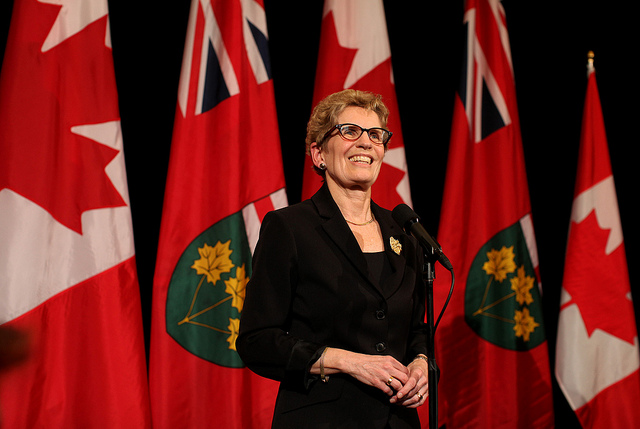Please help rabble.ca stop Harper’s election fraud plan. Become a monthly supporter.
Kathleen Wynne broke a number of taboos last week, proving it’s possible to get elected premier of Canada’s largest province while being a woman, while being openly gay and — perhaps most surprising — while openly defying the right-wing orthodoxy that’s ruled this country for three decades.
It may be this last aspect of her victory that broke the most resistant taboo.
While discrimination against women and gay people has diminished in recent years, Bay Street and the corporate elite have become increasingly confident in imposing an ideology of lower taxes, smaller government and supine obedience to the market.
The centrepiece of this ideological orthodoxy has been an almost phobic attitude towards taxes. The vilification of taxes has profoundly changed our society in recent decades, dramatically limiting our ability to act collectively to achieve common goals that improve our lives, confining us instead to isolated lives as private consumers.
Under Stephen Harper, Ottawa today collects about $30 billion less in revenue than it did a decade ago — $43 billion if corporate taxes are included. That’s $43 billion less each year to put toward public programs like health care, education, child care and pensions — programs that Canadians demonstrably want.
But the right has spooked politicians into believing the public will balk at any measure aimed at recouping some of that lost revenue.
Two years ago, Ontario NDP Leader Andrea Horwath took a brave poke at the anti-tax taboo, demanding a tax hike for those earning more than $500,000.
Bay Street pounced, eager to clobber such impertinence, such brazen deviation from orthodoxy. In a TV interview, one businessman accused Horwath of advocating an “ethnic cleansing” of the rich.
Yet she stood her ground in the minority legislature, and her tax became law. (As a footnote, I’d add that the rich showed remarkable resilience in surviving ethnic cleansing.)
But Horwath’s victory did little to change the political culture; it remained an article of faith in political circles that proposing tax hikes would leave a politician dead in the water.
Into these shark-infested waters Kathleen Wynne waded, proposing in her election platform to increase taxes on those earning more than $150,000 a year — a tax hike that would hit supposedly tax-phobic suburbanites in the 905 belt around Toronto. Instead of having her leg bitten off, Wynne had it gently massaged — and emerged with four more 905 seats and a majority government.
Of course, this won’t stop the corporate elite from demanding an anti-tax agenda — something from which it has benefited enormously. A study released last week showed that Canada’s rich are much richer than we think; the average income in the top 0.1 per cent is actually a stunning $2.1 million, not the mere $1.3 million previously reported.
What the Wynne victory does do, however, is expose the fallacy in claiming the public won’t vote for higher taxes.
It suggests that — far from being the tax-phobic, one-dimensional characters described in economics textbooks — Canadians are capable of seeing that it’s more cost-effective and inclusive to pay publicly for important services like the provincial pension plan Wynne proposed.
Of course, it helps to live next door to the disastrous private U.S. health-care system, source of so many harrowing stories — like the one about the cancer victim who waited to be arrested after robbing a bank, knowing that at least he’d have access to medical treatment in prison.
Canadians not only like public programs, they consider them central to what they admire about Canada. A public poll released last week by the Harper government — part of the run-up to Canada’s upcoming 150th birthday — showed that Canadians regard medicare as the accomplishment that makes them “proudest to be a Canadian.“
This echoes results from 2004, when more than 1.2 million Canadians voting in a six-week CBC TV poll ultimately chose Tommy Douglas, the former Saskatchewan premier who first introduced medicare almost 70 years ago, as the “greatest Canadian.”
The enduring appeal of Canada’s public health-care system is striking after years of anti-tax, small-government orthodoxy — an orthodoxy vigorously encouraged by Harper.
“This is why Stephen Harper is in politics,” journalist Paul Wells recently wrote in Macleans, noting that Harper is determined to drive taxes so low that a future Canadian government won’t have the option of building the kind of social programs that Canadians clearly desire.
Certainly, if medicare were being introduced today, Stephen Harper would be leading the forces insisting we couldn’t possibly afford it.
Winner of a National Newspaper Award, Linda McQuaig has been a reporter for the Globe and Mail, a columnist for the National Post and the Toronto Star. She was the New Democrat candidate in Toronto Centre in 2013. She is the author of seven controversial best-sellers, including Shooting the Hippo: Death by Deficit and other Canadian Myths and It’s the Crude, Dude: War, Big Oil and the Fight for the Planet. Her most recent book (co-written with Neil Brooks) is The Trouble with Billionaires: How the Super-Rich Hijacked the World, and How We Can Take It Back.
This article is reprinted with permission from iPolitics ![]()



